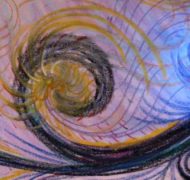Things That Go Bump In the Night
Blog / Produced by The High Calling
Every night, after the tucking in, my youngest clings to my neck and asks that I stay with him for a little while. This mom would like nothing better than to snuggle in beside that warm little body and drift off to sleep with his sweet scent tickling my nose. But laundry waits, and meeting minutes need typed, and there is also his daddy all lonely downstairs. When I reluctantly pull away, the child inevitably says the same thing every night. “But I hear something.” Night Fear. It’s the title of chapter three of Gerald May’s The Wisdom of Wilderness, and our topic of discussion today. In this chapter, May recounts his experience with a bear during one of his solitary camping trips. He never actually sees the bear, as the visitor arrives in the middle of the night; but the bear makes his presence known. May is awakened by growling and snuffling outside his tent.
The bear is so close that May describes the smell of him--a brusque, wild smell, the smell of something alive and very near. May describes the moments following the bear’s departure: I lie unmoving for a very long time after the bear leaves, my senses completely alert, no thoughts, no images, seeing nothing, hearing only my heart and breath and the sounds of the night. For the first time in my life, I am experiencing pure fear. I am completely present in it, in a place beyond all coping because there is nothing to do. I have never before experienced such clean, unadulterated purity of emotion. This fear is naked. It consists, in these slowly passing moments, of my heart pounding, my breath rushing yet fully silent, my body ready for anything, my mind absolutely empty, open, waiting. I am fear. It is beautiful.
May describes the sense of gratitude that follows this encounter as an appreciation of the privilege of being alive in the totality of everything, the gift of fully existing right then and there. His experience with the bear led May to an awareness of how often in life we try to suppress or tame our emotions. May asserts that in this process we lose the gift of increased awareness--of being in the moment--which strong emotions can give. This is a rich chapter with many thought-provoking topics. The one I would like to camp on, however, is this idea that May’s night fear birthed in him--the idea that coping is counter to healing, counter to living. May sees coping as an attempt to anesthetize our emotions, and therefore as a means of separating ourselves from our true nature. In my psychiatric practice how many times did I help patients cope with their feelings, tame the power of their emotions? I no longer believe that was helpful. Even when I assisted people in uncovering long-buried emotions, I seldom encouraged them to savor the life-juice of the feelings themselves; the rich dark love-nature of grief, the warming fire of anger, the subtle luminosity of loneliness, the pure gut-driving power of sexual desire, or the exquisite clarity of fear…Wild, untamed emotions are full of life-spirit, vibrant with the energy of being. They don’t have to be acted out, but neither do they need to be tamed. They are part of our inner wilderness; they can be just what they are.
These words are beautiful. They mesmerize me. But as one who works in the mental health field, I’m struggling with them. In my work in rehabilitation psychology, I counsel people who have been through traumatic, life-altering events. In my experience, a period of “coping” must take place in order for these individuals to pick up the pieces of their lives. They have no escape from the tragedy they are in. They cannot retreat to a place of solitude in an attempt to improve their situation. They have to learn to return to the everyday details of their lives with this new thing. Sometimes it’s the loss of a leg. Sometimes it’s paralysis. Sometimes, it’s the alteration of a person they love due to a brain injury. Coping helps them get to a place where they can later deal with the emotions involved on a deeper level. So, although I hear what May is saying, and I recognize the beauty in fully experiencing strong emotions, I’m not sure that is always the practical approach. What do you think? Food for thought: **May says Fear is life-energy: full-bodied, rich, clean, exquisite, sweet. When you get right down to its bones, fear is love. Fear is made of love. That’s why perfect love--love in its purest form--casts out fear. This sounds sort-of counterintuitive. What are your thoughts on this comment? **We also see May referring to the Wisdom of nature for the first time in this chapter. He senses the Wisdom guiding him, keeping him in the present moment and freeing him from distractions. What thoughts does this naming of the Power Wisdom provoke in you?
Artwork by L.L. Barkat, used with permission. Post by Laura Boggess of the Wellspring





